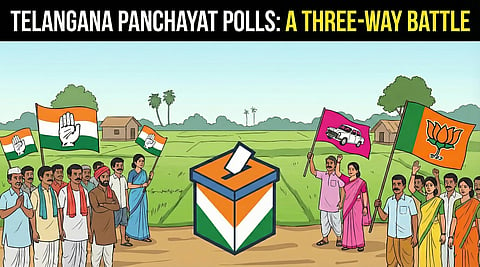

Village level politics in Telangana just got a lot more heated. The State Election Commission has announced the dates for the Gram Panchayat elections—December 11, 14, and 17. Officially, these are supposed to be non-party contests, but let’s be honest: it’s a clear three-way tussle between Congress, BRS, and BJP. With Congress riding high after its Assembly victory, everyone’s watching to see if the rural mood has actually shifted. Three big players are pulling out all the stops, from welfare schemes to big promises of cash and development.
INC: Saree Giveaways & BC Quota Tensions
Ruling Congress is putting everything on the line with its welfare agenda. Their headline move is ‘Giveaways’. The ‘Indiramma Saree’ campaign—crores of sarees distributed to women, aimed squarely at winning over a huge female voter base. Ministers are out in villages, making every event look like both a salute to Indira Gandhi and a statement about the party’s commitment to women’s dignity.
But there’s a hitch. The Backward Classes (BC) reservations have become a political headache. Congress tried to increase BC reservations in local bodies to 42%, but the High Court stepped in and stalled the move. Now, the elections will go ahead with the old reservation percentages (only 27% for BCs), leaving many BC leaders upset and accusing Congress of falling short. To try and contain the backlash, Congress has promised to give 42% of its tickets to BC candidates anyway—a workaround, since they can’t actually change the quota due to the Supreme Court’s 50% limit. It’s a delicate balancing act, and everyone knows the BC vote could decide the outcome.
BRS: Desperate for a Comeback
For BRS, these elections are a fight for survival. After losing the Assembly polls and taking a hit in the Lok Sabha elections, the party badly needs a win. With its working president at the helm, BRS is trying to bounce back by hammering away at Congress’s “unkept guarantees.” Their message is simple: Congress hasn’t delivered, and only BRS can kickstart progress again.
BRS leaders are out reminding voters about all the roads, water projects, and development schemes they brought in their ten years at the helm. They’re going door-to-door, pushing the line that things were better under BRS and that Congress is falling behind. If they can manage a strong showing in the panchayat elections, it’ll boost party morale and show that last year’s defeats were just a setback, not the end.
BJP: Betting Big on Development Funds
Then there’s the BJP, determined to finally break into Telangana’s rural landscape. BJP State President Ram Chander Rao says the party will field their supporters in every single panchayat—no more sitting on the sidelines. Meanwhile, Union Minister Bandi Sanjay Kumar is promising for allotting central funds. He’s told villages in his Karimnagar Lok Sabha seat that if they elect BJP-backed candidates unanimously, he’ll give them ₹10 lakh from his MPLADS funds. It’s a direct offer—vote for us, get development money, no middlemen. The BJP wants to drive home the message that real rural progress comes straight from the Centre, and that electing a BJP backed Sarpanch is the fastest way to get that funding. Their campaign is all about drawing a sharp contrast between what they call genuine, visible help from the central government and what they label as empty promises from Congress and BRS.
What’s Really at Stake in Telangana?
Telangana’s Gram Panchayat elections are more than just routine local polls. Even though there are no party symbols on the ballots, it’s clear that the big three—Congress, BRS, and BJP—are treating this as a high-stakes contest. For the ruling Congress, a strong performance in rural areas would be a major boost for CM Revanth Reddy. It would prove that people have faith in the “six guarantees” he keeps highlighting and give the party valuable momentum for the upcoming Urban Local body (Municipal and ZPTC/MPTC) elections. But if Congress underperforms, critics will argue that rural voters are losing patience with the slow progress on promises.
BRS is in a fight for its political life. This election is crucial for them. If they can put up a good show, they can still claim relevance beyond urban centers—maybe even position themselves as the main challenger to Congress. For BJP, these results are crucial. They want to demonstrate they’re the true opposition in Telangana, and show that their approach—relying on central government backing and promising direct benefits—can actually help them gain ground in rural areas ahead of the 2029 Assembly elections.
In the coming weeks, expect intense campaigning. Politicians will roll out welfare schemes, make new development pledges, and intensify debates over issues like caste and BC reservations. This election isn’t just about winning a handful of villages. The results could have a lasting impact on Telangana’s political landscape.
